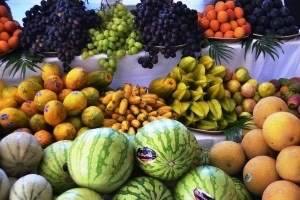Tu B’Shevat: Bearing Fruit for Messiah

We don’t often think of winter as a season for bearing fruit. Yet the Scriptures encourage us that fruitfulness is not based upon times and seasons. Whether in season or out, we are to be producing spiritual fruit that testifies of the life of Yeshua. This fruitfulness is not based on a season, but is developed by abiding in Yeshua (Jn 15:5). A winter holiday called Tu B’Shevat reminds us of this type of fruit.
Tu B’Shevat is a minor Jewish holiday (meaning it’s still a work day), and is one of four Rosh HaShanas’ (“New Years’”) mentioned in the early Jewish writings (the Mishna). Tu B’Shevat is the “new year for trees“. The name, Tu B’Shevat, comes from the date of the holiday, the 15th day of the Hebrew month of Shevat. This year it will be celebrated on January 25th.
In the second Temple period, Tu B’Shevat was originally a day when the fruits that grew from that day on were counted for the following year regarding tithes (Mishnah, Rosh HaShana 1:1; Talmud Rosh HaShana 2a, 14a).
Influenced by these early Jewish writings, people in the Middle Ages started to celebrate Tu B’Shevat with a minor ceremony of eating different fruits. In modern times, Tu B’Shevat has become popular with many Jews (some think of it as Jewish Arbor Day). It is now customary to eat different types of fruit and nuts on this holiday.
Traditionally, these types of fruit are associated with the Land of Israel in the Hebrew Bible. These fruits include: grapes, dates, figs, olives, and pomegranates. There are also other types of fruit and nuts included: oranges, bananas, walnuts, and pistachios (which have inedible exteriors and soft edible insides); dates, apricots, olives and persimmons (which have soft exteriors, but a hard pit inside); and figs and berries (which are eaten whole).
Though this may not mean much to some, we can learn spiritual truths from these four categories of Tu B’Shevat foods, as we as talmidim (disciples) develop spiritual fruit in Messiah:
-
Fruits and nuts with hard, inedible exteriors and soft edible insides:
What a vivid reminder of our spiritual life in Messiah! While we are in this world, we often need to be “hard on the outside,” so to be resistant to sin and “not conformed” to the influences of the world (Rom 12:2). This is why the Scriptures often teach us to “resist the devil” (James 4:7; Eph 6:13; 1 Peter 5:7-9). On the other hand, since “greater is He who in us than He who is in the world” (1 Jn 4:4), we need to be soft on the inside, that is, yielded and responsive to the Holy Spirit while being resistant to the unholy spirit.
This is not natural, but is a matter to grow into through discipleship. We must learn to resist the devil, mortify our flesh, and repel the world’s teachings, while all the time yielding to the Spirit’s promptings and His still small voice that guides us to love our enemy, and bless those who curse us.
-
Fruits and nuts with soft exteriors, but with a hard pit inside:
Here we have another illustration of our mature walk in Messiah. The soft exteriors remind us how we need to be loving to all, yet have a “hard pit inside.” We are not to be hard hearted, but rather uncompromising in the absolutes of the eternal Word of God. This gives us the internal character of righteous integrity and an iron backbone to withstand the wayward winds of this world. How easy for our merciful “soft exterior” to be offended and hurt by the unkindness of this world’s system! Yes, our internal responses to the world’s attack of our testimony in Messiah can make “the love of many grow cold” (Mat 24:12). This is why we need a “hard pit;” not a cold, hardened heart, but a heart firm in faith of His unchanging love in Yeshua.
This is also not natural, and must be addressed in discipleship. We need to be taught the absolutes of the Word of God; the primary matters of our faith, and learn to distinguish between what is essential and what is non-essential (Mat 23:23). We need to learn how to give liberty on what is secondary, but remain unflinching on what is primary to the faith.
-
Fruit that is eaten whole:
As we mature, we enjoy all of God’s Word. New believers may think some portions of God’s Word are difficult to digest (Jn 6:60). But as we press on in His eternal Word, we recognize that “solid food is for the mature” (Heb 5:14), and that “all Scripture is both inspired and profitable” (2 Tim 3:16). As we mature in Messiah’s truth and, therefore, walk in the truth, may every area of our life bring “praise to His glory” (Eph 1:6,12,14). As the Passover Lamb was eaten whole and unbroken (Exodus 12:8-9, 46; John 19:36), so “the Scripture cannot be broken” (Jn 10:35), for the truth of the written Word reveals the truth of the Living Word.
This too is not natural and is a discipleship matter. Without straightforward discipleship, believers will rationalize the Scriptures and act like the Bible is “trail mix,” picking out only what they like, and falling into immorality and rebellion.
-
Fruit that is associated with Israel:
Maturity sees fruit that becomes less concerned with our personal agendas and more concerned with God’s eternal agenda. Maturity for both Jewish and Gentile believers will further reflect the concern that the apostle to the Gentiles taught regarding the ministry of prayer: “My heart’s desire and prayer to God for Israel is that they might be saved” (Romans 10:1). This will become our own heart’s desire as we grow to become people after God’s own heart, like David who taught us to “Pray for the peace of Jerusalem” (Ps 122:6). This is strategic in God’s redemptive plan, as the Second Coming is tied to Israel’s national repentance toward God and faith in Yeshua. For Messiah said of Jerusalem, “You shall not see me again until you say, ‘Blessed is He that comes in the name of the Lord” (Mat 23:37, 39). May our maturity in Messiah reflect the heart of the King of the Jews in having fruit associated with Israel!
This as well is not natural and is a matter for discipleship. Many will associate with Israel for chauvinistic reasons, sympathetic reasons, or for many personal reasons. However, we must disciple people in the biblical calling of God upon all believers to pray for the salvation of Israel, and to make Israel desirous for the Messiah. The testimony of God’s faithfulness is at stake, and only solid discipleship will testify that Yeshua is God’s faithfulness to Israel and also to the nations.
This year, may we all mature as disciples who bear fruit that testifies of the God of Israel’s love, fully and forever received in Yeshua, the Jewish Messiah and Savior of the world!
Happy Tu B’Shevat!




Add Comment